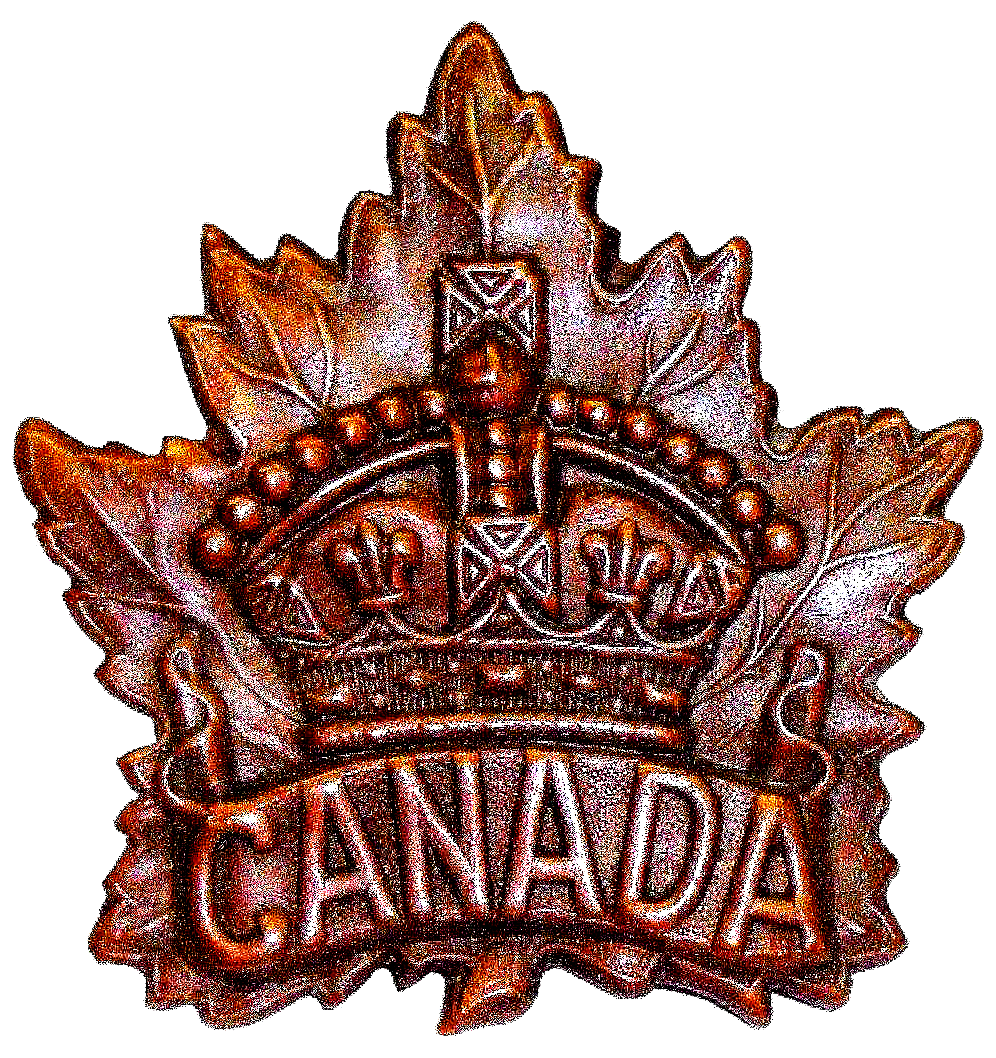
OPCMH
ORGANIZATION
for
PRESERVATION
of
CANADIAN
MILITARY
HERITAGE |

OPCMH
Visitor No.:
1492198
since
2015-03-21
| |
HISTORY OF WORK POINT BARRACKS
by Jack Bates
PART 3 — 1894 to 1906
1906
The SAPPER
April 1906
VICTORIA, B.C. (2. 3. 06)
The accompanying photo of the 2/44h Company football team – winners, Esquimalt Garrison Football League, whose doings have been recorded in previous issues, is forwarded for favour of reproduction please. Reading from left to right: Back Row – Lance Corpl. Lockwood (reserve), Sappers Rixon, Richardson, Deigran, Dalton (reserve). Middle row – Lance Corpl. Burtoft, Sapper Read (captain), Major H. Bland (O.C. R.C.E.), and Corpl. Worrall, Sapper Jones, Bugler Baldwin (trainer). Front Row – Sappers Bryan, Hunt, Young, Scaley, Lance Corpl. Thompson (vice-captain).
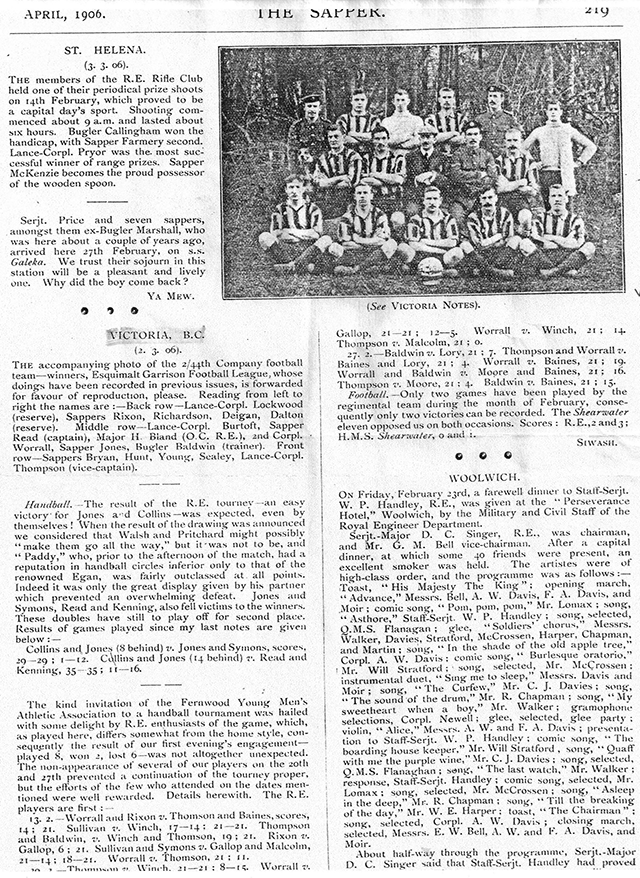 |
THE SAPPER 1906
... run cursor over photo to zoom image ... |
Daily Colonist
April 1, 1906
A CANADIAN OFFICER INSPECTS FORTIFICATIONS
Lieut. Col. Rutherford Director of Artillery is at Work Point Barracks
Interest in the departure of the Imperial troops stationed at Work Point Barracks and in the taking over of the same, as well as the Esquimalt defences, by the Canadian government is increased by the presence in the city of Lieut. Col. R.W. Rutherford, R/G.A., director of Artillery on the general staff. Col. Rutherford quietly arrived at the barracks Thursday night, and since then has been making a minute investigation of the fortifications. Yesterday, in company with Lieut. Col. English, R.E., he spent most of the afternoon at Esquimalt examining the big guns.
To the Colonist Col. Rutherford said that his trip was one to gain information and particulars regarding the methods of the Imperial forces at this point. “It is not a regular inspection visit. I am merely looking over the barracks and fortifications for particulars.”
Asked when the first Canadian contingent was expected to leave the east, for Victoria, the visiting artillery expert said it was impossible to say. “The date, as far as I know, has not been settled” he said in reply to the Colonist inquiry. Col. Rutherford declined to discuss the question of the strength of the corps that would be sent out. He will be at the barracks for some days, and on his return to Ottawa will prepare a report for the minister of militia based on his observations made here.
While here it is quite probable that the staff officer will meet and discuss with the Imperial soldiers who are departing of joining the Canadian service and the terms on which they will be admitted. While the Canadian service may offer better inducements in some respects, there are questions regarding allowances – especially affecting married men – that are not quite so advantageous or liberal, and before Mr. Tommy Atkins withdraws from the Imperial to join the colonial colors he wants to be perfectly satisfied that in every respect he will be treated equally as well by the Dominion as the mother country.
New York Times
April 15, 1906
EVACUATION OF ESQUIMALT
(Special to the New York Times)
OTTAWA, April 14. — On the first day of May the Imperial forces will evacuate the fortress at Esquimalt, Victoria, British Columbia, their places being taken by soldiers of the King under the direct control of and maintained by the Dominion of Canada. This event will mark an epoch in the development of the relations this great and rapidly growing colony and the mother country.
On the date mentioned the last British soldier in its restricted sense, will bid a farewell to the continent on which he and his forebears have played stirring parts in the course of the events marled by human progress in three centuries. The Victorians are planning to give expression in some way to their appreciation of the admirable manner in which officers and men have comported themselves during their sojourn in that part of the Dominion.
Daily Colonist
April 28, 1906
LAST FIELD DAY BY IMPERIAL TROOPS
Enjoyable athletic Contests Witnessed by Large Crowd Yesterday
A FASHIONABLE AUDIENCE PRESENT
List of Competitors and Winners in the Various Events
The last field meet that will be held in this city by the Imperial troops took place yesterday afternoon at Work Point barracks, and proved the success anticipated. The parade grounds had been turned into an athletic enclosure, and was gaily decorated with flags and bunting, the royal ensign occupying the most prominent position. The committees had arranged a very fine programme, consisting of 30 numbers, and besides the sergeant’s mess of both the R.E. and R.G.A., had refreshment booths where soft drinks and light refreshments could be obtained. The officer’s mess dispensed afternoon tea in a specially arranged dining room. There were a large number of Victorians present to enjoy the afternoon’s sport, among them were included a number of the elite of the city.
The grounds presented a very pretty appearance. What with the handsome decorations and the many pretty costumes of the ladies and the uniforms of the men the scene presented will long be remembered by those present. Ever since the regiment has been quartered in this city the officers and men have had an annual field day, and this year they set out with the intention of surpassing all their efforts, and that they were successful goes without saying. From start to finish there was
Not a Hitch of Any Description
and everything went off in a first class manner. During the afternoon the Garrison band was present and added much to the enjoyment of the day’s sport by its lively airs. Another attraction which assisted greatly in making the affair a success was the Garrison minstrels, who from first to last were hardly ever absent from the field.
The arrangements for the sports were well attended to, the field having been roped off in good style in order that the competitors might not be interfered with. This added materially to the success of the sport, and assisted the committee in their arduous work.
The sports, which were all keenly contested, commenced at 10 o’clock with throwing the cricket ball, followed with the shot putting and the preliminary heat of the lightweight tug of war teams. This was the event of the day, and no finer pull has been seen in this city for some time. Teams were entered from the R.E., R.G.A., and H.M.S. Shearwater. The first mentioned were drawn to pull first, and it was this event that caused the excitement. The teams were composed of ten men, with the maximum weight of 1,540 pounds, or, according to the rules, 110 stone. The R.E. team was slightly heavier, the exact difference being only five pounds. The first heat was the best, and it was only after 13 minutes 45 seconds of hard pulling that the R.E. team won. The second was also a good one, but eventually the R.E. again won this heat, lasting 10 minutes 35 seconds.
After an interval for lunch the programme was continued, and some very
Evenly Contested Events
were witnessed. In the heavyweight tug of war, as in the lightweight, the Royal Engineers were the winners, after taking the first pull with a man less than their opponents. The exact time of this pull was not taken, but it came very close to that made during the morning trial.
All the events were well filled, and in some cases two heats had to be run in order that all might compete. The obstacle race was the most interesting event of the whole day, and created a great deal of amusement. The first obstacle to overcome was a well greased construction set at an angle of about 45 degrees, which the contestants had to climb over. The next was to crawl under a log that gave only enough space for a small man. The next over a greased pole, climb through a rope a distance of about twenty feet. Next they had to crawl through a swinging barrel, and then, to cap the climax, they were forced to take a swim in the ice cold water. After scrambling out of this the contestants had to crawl under a well pegged tarpaulin plentifully supplied with grease, and after they had concluded this they presented an appearance as if they had been through a cyclone. But it was good sport and everyone enjoyed it. A special prize was given to the contestant securing the greatest number of points during the afternoon. The result of this was a tie between Bdr. Provins and Spr. Simons, each securing 35 points. At the conclusion of the events Mrs. (Capt.) Bunbury presented the prizes to the winners.
The following is the
List of Winners
Throwing the cricket ball – Bdr. Sanford, 94 yards; Gr. Kerwin, 90; Gr. Bryne, 86.
Putting the shot – Sergt. Paley, 30 feet; Gr. Darlington, 29 ¾; Gr. A. Brynes, 28 feet.
Long jump – Gr. Darlington, 19 feet; Br. Provins, 18 – 4; Sullivan, 17 – 6.
First heat lightweight tug of war - Royal Engineers vs Royal garrison Artillery – won by Royal Engineers in two heats. Time – 13.45 and 10.35.
Trumpeter’s race – Trpr. Spragge; Buglar Baldwin.
N.C.O.’s race ( below rank of sergt.) – Bdr. Provins, Corp. Lyons, Corp. Worrall, Spr. Collins.
High jump – First, Bdr. Sanford and Corp. Corp. Sullivan, tie; Spr. Simons and Gr. Darlington, tie.
Quarter mile flat – Bdr. Provins, Spr. Simons, Corp. Worral, Tptr Spragge.
Warrant Officers – Sergt. Sisman, Sergt. Paley, Mr. Blackman.
Relay race – Royal Engineers team, composed of Crisp, Worrall, McIntyre, Simons.
Veteran’s race - Pte. Daily, Spr. Wilaims, Spr. Bass.
Hockey ball race – Corp. Collins, Corp. Warder, Spr. Rixon.
100 yards – Spr. Simons, Bdr. Provins, Corp. Lyons, Gr. Hamilton.
Sack race – Spr. Atkinson, Gr. Darlington, Gr. Burns.
Half mile – Spr. Kenning, Spr. Crisp, Gr. Jasper, 5th regiment, Spr. Simons.
Three keg race – Provins and Lyons, Robinson and Miller, Collins and Worrall.
Hurdle race – Spr. Crisp, Spr. Atkinson, Spr. Simons.
Greasy pole – Gr. Dalton.
Victoria cross – Ford and Fletcher, Worrall and Dalton.
Potato race – Miss Moorhouse and Mr. Blackman, Mrs. Mosedale and Corp. Shute, Mrs. Kerison and Sergt. Sisman.
Boot race – B.O. Gall, Gr. Roley, P.O. Charleton.
Egg and spoon race – Gr. Rowley, Sergt. Pale, gr. Ford.
Officer’s race – Capt. Hunt, Major Bland, and Capt. Bunbury.
Boys – J. Williams, W. Sharcott, P. Good.
Girls – E. Fisk, J. Dally, E. Moorhouse, I. Friar.
Obstacle – Spr. Gooderham, Gr. Dowton.
Ladies – Miss M. Pitts, Miss J. Green.
Committee men’s race – Sergt. Paley, Corp. Warder, Sergt. Williamson.
Consolation race – Archibald Robinson and Reilly.
Heavyweight tug of war – Royal Engineers.
Lightweight – Royal Engineers team, compose dof Stanley, Thompson, Walsh, Hunt, Eastick, Wengral, Rixon, Longley, Dack, and Mackwood, Corp. Jones, captain; Royal Garrison Artillery second; and H.M.S. Shearwater third.
The following committee had charge of the arrangements: Major Bland, R.E., president; Capt. Wright, A.S.C; Lieut. Foll, R.G.A., and Lieut. Hon. F.G. Hood, R.E. Sub committee, C.S.M. Friar, R.G.A., president; Sergt. Jeremy, R.E., Mr. Blackman (school master), S.Sergt. Williamson, A.O.C., Sergt. Paley, R.G.A., Corp. Warder, R.G.A. and Corp. Reneele, R.E., secretary. Judges: Capt. Bunbury, R.., Lieut. Yates, R.E. and Lieut. Foll, R.G.A. Starters: Capt. Brady, R.E., Lieut. Elliston, R.G.A., Lieut. Hon. F.G. Hood, R.E. and Lieut. Thompson, R.G.A. Referee: Lt. Col. English.
May 8, 1906
CANADIAN GARRISON TAKES OVER FORTS
No. 5 Co. Royal Canadian Artillery Formed Yesterday Morning
Captain Elliston is in Command
Taking Over Forts and Stores Commenced at Once — R.E. Not Taken Over
The Canadian Government took over defences of Esquimalt yesterday from the Imperial Troops; the forts and stores of the R.G.A. are now held by a new formed Canadian Garrison company.
Yesterday morning, No. 5 Company, Royal Canadian Garrison Artillery was formed at Work point. Captain Elliston, R.A., now R.C.G.A. was given command of the company. The newly formed company at present consists of only forty men, members of R.G.A. who took service with Canada. To augment the company to its full strength of 120, about one half the strength of the present company of Imperial troops, Sergeant Major Warder expects troops to be sent from the east to fill the complement of 120 men.
With the formation of the Canadian Garrison Company the work of taking over the forts and stores of the R.G.A. commenced at once and will probably continue all week. The stores of the Royal Engineers were not taken over and no action was taken regarding the change of this branch. When this change will take place is unknown.
Captain Muspratt-Williams of the R.G.A. is the only commissioned officer, other than Col. English, who, it is stated, will be transferred to Kingston, and Captain Elliston, who has taken service with the Canadian Company. Captain Williams will be a captain of the Canadian company, the strength of which will be, one major, two captains and four subalterns.
When the change for which the officers and men had been eagerly awaiting took place there was considerable excitement, and
Preparations Began at Once
for the departure of the troops. The departing members of the Royal Garrison Artillery will probably leave for England on Saturday. It is uncertain whether the Royal Engineers will also leave then, as their stores have not been taken over yet.
The officers have packed their goods in the quarters fronting the harbor entrance, and some have arranged to sell out. This afternoon Mr. L. Eaton will conduct an auction sale of Captain Popham’s goods at the officer’s quarters. In the married quarters and cantonments there is much excitement, the accumulated belongings of the troops being made ready for travelling, and all are getting ready to vacate.
It is expected that 300 troops will leave on Saturday by the steamer CHARMER which will carry the men to Vancouver. The party will be taken in charge by the C.P.R. for the overland trip and will voyage to Liverpool by the new C.P.R. liner Empress of Britain. At Liverpool the company will be disbanded.
Tomorrow evening at the drill hall the citizens of Victoria and the Fifth Regiment, C.A. will give
A Farewell Entertainment
to the departing Imperial troops. The cup which is to be presented to the departing company will be on exhibition tomorrow in the windows of Messrs. Challoner and Mitchell, jewellers of Government street. The presentation of this cup will be followed by musical entertainment. As many persons have signified a wish to contribute small sums to the presentation it is expected that a small admission fee will be charged at the drill hall.
With regards to arrangements for the farewell entertainment the smoker committee of the Fifth Regiment held a meeting last night at the drill hall and completed all arrangements for their concert to be held tomorrow (Wednesday) evening commencing at 9 p.m. Though it is understood that the entertainment will be preceeded at 8 p.m. by a formal presentation and a short program in charge of the mayor and a committee of citizens for which a program and general arrangements will be published later.
But it is distinctly understood that this portion of the entertainment must be completed by 9 p.m. sharp when all who are not in uniform will be expected to leave the hall so that the Regiment may carry out the social which they have set back to meet the convenience of the citizen’s committee.
City’s Council Passes Resolutions
At the meeting of the City Council last night it was moved by Alderman Yates and seconded by Alderman Vincent that the Council deemed it fitting to express the unfeigned regret which is felt by all classes of the community at the departure of the Imperial troops. The resolution passed in full in another column.
Withdrawal of Imperial Troops
It was moved by Ald. Yates, seconded by Ald. Vincent that:
Whereas, the time has arrived, in accordance with the decision of the Imperial authorities, for the withdrawal of the Imperial troops from their station at Work Point Barracks and their return to England.
Therefore be it received that this council deem it fitting to express the unfeigned regret which is shared by all classes of the community at their departure, the high estimation in which both officers and men have always been held by the citizens, and the sense of loss felt at the thought that the relations which have existed so long and so happily between them should so soon be severed. The council desires to assure them that they will always have a place in the esteem and regard of the citizens generally, and that in leaving they carry with them the best wishes that can be expressed for their future welfare, happiness and fair renown.
May 11, 1906
TROOPS WILL SAIL FROM C.P.R. DOCK
Leave on City of Nanaimo From Belleville St. Docks — Forts Taken Over
The Imperial troops gave up their last fort in the Esquimalt defences yesterday morning, when Lieut. Elliston, No. 5 Co., R.C.G.A., and Sergt. Major Mulcahey, took over the Signal Hill Works, the other batteries having already been taken over since Monday.
The Signal Hill works had not been completed by the Imperial forces, and it is not known whether the two 9.2 guns for this week will be mounted. The emplacements are ready, and the Engineers were reparing to mount the guns in their barbettes – they are central pivot barbette guns – when, with the expected change, orders were telegraphed from Ottawa to suspend work. Now only a small amount of stores belonging to the R.E. are to be taken over.
The departure of the Imperial trops will be from the C.P.R. dock on Belleville street at noon tomorrow, instead of from Esquimalt, as previously arranged. The troops will march to the wharf, where they will embark on the steamer City of Nanaimo, which has been secured to convey them to Vancouver to entrain to Montreal, where they are to embark on the steamer Empress of Britain.
The cup presented by the citizens to the departing troops is on view at Challoner & Mitchell’s jewelry store.
COLONIST
May 12, 1906 (7)
DEPARTURE OF TROOPS HAS BEEN DELAYED
Will Leave on Thursday Next Instead of Saturday…Delay Causes Annoyance
The departure of the Imperial troops has been postponed until Thursday next; a telegram to this effect was received at noon yesterday by Lt. Col. English, commanding officer. The receipt of the dispatch, when made known, caused considerable annoyance. As one of the officers tersely put it: “The Canadian government seems to humbug us a good deal about our going.”
In the married quarters this news was received with surprise, then intense annoyance, for the soldiers and their families had packed up all their goods and were in readiness for the departure arranged for Saturday.
The bachelors, likewise, were disappointed, although the inconvenience did not affect them as greatly as it did those in the married quarters.
No reason is given for the change in the plans. It had been arranged that special cars would convey the troops to the C.P.R. dock at Belleville street, where the embarkation would take place on board the steamer City of Nanaimo, which would leave at noon for Vancouver. Connection was to have been made with the new Empress steamer Empress of Britain, and the Imperial troops were looking forward to a record trip home from this station. Now they will travel across the Atlantic by the steamer Virginian.
TIMES
May 12, 1906
“Imperial Troops at Esquimalt” at the time of their departure from
Work Point Barracks and returning to England.
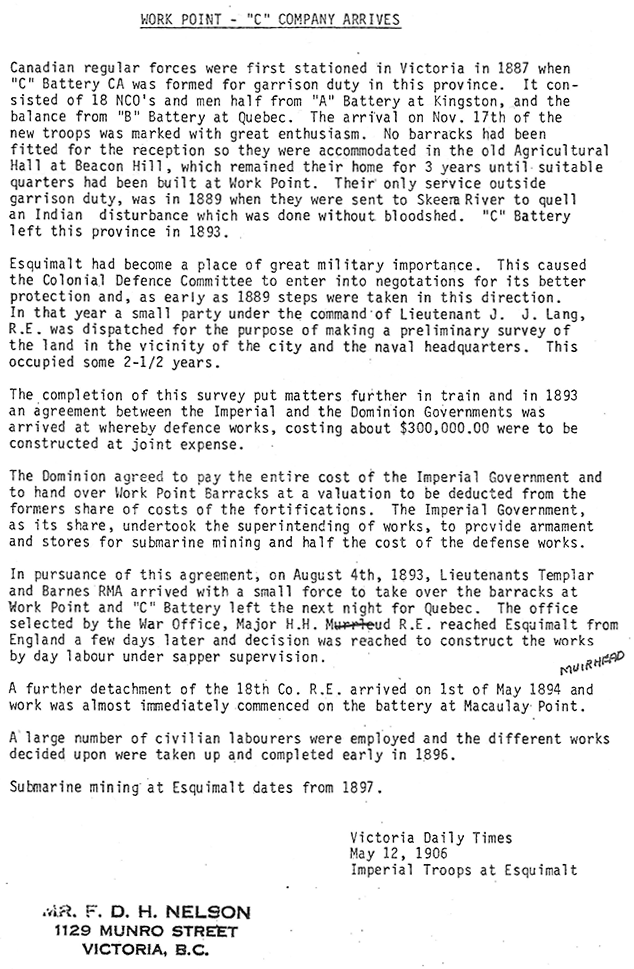 |
| WORK POINT – C BATTERY ARRIVES |
DAILY TIMES
May 12, 1906
LAST BRITISH TROOPS LEAVING CANADA
Last post will soon sound finally for the Imperial troops in Canada. Their departure marks a new era in the history of the Dominion and shows that the lusty scion of the British race is able to take up its share of the burden of empire. Probably never in the future will Canada be given more than a fleeting glance of those who for many years have defended both seaboards and engaged in in one or two minor wars within the confines of the Dominion, and it is with a sigh of regret that Victoria, in particular, bids farewell to those who have added much to the pleasures of her social, military and athletic life.
In the short space of a newspaper article only a brief outline can be given regarding the Imperial forces and that confined to British Columbia, but it is hoped the following will serve at least to bring to mind the importance of the services rendered to the Province by the thin red line and its companion forces.
The military occupation of British Columbia dates from 8th November, 1858, when the advance guard of a detachment of 145 officers and men of the Royal Engineers reached Esquimalt. This body, consisting chiefly of Engineers, left England on 2nd September on the steamer La Plata, under command of Capt. Parsons, and came by way of Panama. They immediately went to Fort Langley, moving afterwards to the site chosen for a permanent camp, about a mile above what is now New Westminster, and gave it the name Sapperton, that exists today. The actual location was that now covered by the British Columbia penitentiary. Shortly afterwards another small body, chiefly carpenters, under the command of Capt. Grant, arrived via the same route, and proceeded to erect buildings at the new camp. Col. Moody, the officer in command and also appointed chief commissioner of lands and works and deputy governor, reached here on Christmas Day, being sworn in on January 4th, 1859.
The main body of the troops, consisting of 118 non-commissioned officers and men, 31 women and 34 children, and commanded by Capt. Luard, and including all the other officers, took the long trip round Cape Horn in a sailing vessel, the Thames City. They left Gravesend on October 10th, 1858, arriving at Esquimalt on April 12th, 1859, from where they at once proceeded on the steamer Eliza Anderson to the new camp. During the voyage a most interesting newspaper was published weekly, called “The Emigrant Soldiers’ Gazette and the Cape Horn Chronicle.” This was afterwards printed at the men’s own expense, and the few remaining copies are cherished by the survivors. It is interesting to note that the original edition in manuscript has been preserved in the archives of the Province.
Col. Moody had two sources of dispute thrust upon him almost immediately upon arrival, but finally arranged them to his own satisfaction. The first was regarding the location of the camp. Governor Douglas had selected Langley, now a prominent farming community on the south side of the Fraser, as the capital, but the location did not appeal to the military instincts of the new commander. He chose what is now New Westminster, and finally his wishes prevailed. The two detachments at once went to the new location and proceeded to lay out the camp at Sapperton, erect buildings and prepare for the main body that was shortly to arrive.
But even then, Col. Moody’s troubles were not ended. There was a small settlement at the point called Queensborough, a name which came in conflict with several other places of prominence, and he thought it would be wise policy to eliminate the “s.” This aroused a storm in a teapot and finally the dispute was referred to Queen Victoria, who cut the Gordian knot by choosing New Westminster, as the name of the city that was to be. Such a small matter was probably never decided by Her Majesty before, and had New Westminster remained the capital the name was particularly appropriate, recalling associations with the home of the British parliament in Westminster.
The good work done by this body of Royal Engineers should not be forgotten by the people of the Province. They designed and built the first Anglican churches at New Westminster and Sapperton, and also the first schoolhouse there. They surveyed and laid out the Royal City, Hope, Yale, Lytton, Douglas, Lillooet, Clinton, Richfield and other townsites. They acted as the escort that brought down the golden harvest of Cariboo, and last, but not least, established the lands and works department and government printing office in this city. From the latter was issued the first number of the B.C. Gazette on January 1st, 1863. To an engineer officer also was given the appointment of colonial treasurer, in the person of Capt. Gossett. Under his direction the treasury and assay offices were established together with a branch of the Imperial mint at New Westminster. The latter was abandoned after a short time and permitted to go to ruin. A few specimens of its coinage remain that are being carefully preserved by their lucky owners. To the Royal Engineers must also be given the credit of designing the first Provincial coat of arms and the old British Columbia postage stamps. It will thus be seen that during their four years sojourn, with headquarters on the banks of the Fraser, these pioneers did great work that will always remain a monument to their ability.
October, 1863, saw them finally mustered out of the service. All the officers and about 30 men returned to England, but the large majority decided to cast their lot with the new country. Of these only eighteen are now known to reside here, and their names, to those acquainted with subsequent provincial affairs, affords a roster of honorable achievement, sterling patriotism and a high ideal of public trust. Many picturesque figures have crossed the great divide whose names even it is impossible to mention here, but one and all proved good citizens and a welcome addition to the population of British Columbia.
“THE FIRST OFFICERS”
- Col. Richard Clement Moody, R.E.
- Capt. John Marshall Grant, R.E.
- Capt. Robert Mann Parsons, R.E.
- Capt. Henry Reynolds Luard, R.E.
- Lieut. Arthur Reid Lempriere, R.E.
- Lieut. Henry Spencer Palmer, R.E.
- Staff Asst. Surgeon John Vernon Sedall.
“THE BOYS OF THE OLD BRIGADE”
Survivors of the First Garrison Now Living in British Columbia
- Thomas Argyle, Rocky Point, Farmer
- Samuel Archer, Victoria, Shoemaker
- L.F. Bonson, Keatsey, Farmer
- Robt. Butler, Victoria, Compositor, Government, Printing Office
- Henry Bruce, New Westminster, Carpenter
- John Cox, Victoria, Carpenter
- Alen Cummins, New Westminster, Assistant Steward, R.C. Hospital
- Has Digby, New Westminster, Steward, R.C. Hospital
- Alfd. Howse, Vancouver, Land Surveyor
- William Hall, Sumas, Farmer
- Matthew Hall, Chilliwack, Farmer
- Wm. Haynes, Victoria, Professor of Music
- John Jane, Savonas, Merchant
- Phillip Jackman, Aldergrove, Farmer
- John Musslewhite, Sunmas, Farmer
- John Maclure, Matsqui, Land Surveyor
- George Turner, New Westminster, Civil Engineer
- Richard Wolfenden, Victoria, King’s Printer
Subsequent to the departure of the Royal Engineers the military forces in British Columbia were for many years purely Canadian. Practically forty years elapsed before Imperial troops again arrived for a lengthened stay in the Province, the force that is now about to depart. The advance guard, consisting of Lieuts. Templer and Barnes, with fifteen non-commissioned officers and men of the Royal Marine Artillery, arrived in Esquimalt on 4th August, 1893. To cover the hiatus thus created, it is proposed to shortly recapitulate the local forces that were created, disbanded, and re-created during this intervening two score of years.
Almost as soon as the Royal Engineers left for England the whole country was agog over the Trent excitement. The feeling was intense and two companies of volunteers were immediately organized, one at Victoria and the other at New Westminster. The first commandant here was Capt. Lang, while at New Westminster Capt. Brew, and later Capt. Pritchard, occupied a similar position. The Seymour Battery of artillery volunteers also came into existence at about the same time and was commanded by Captain (now the late Sir) Henry P.P. Crease. These constituted the military force of the colony until the Province entered Confederation in 1871, when they became, ipso facto, disbanded.
The first evidence of military spirit subsequent to Confederation was shown in this city when, late in 1873, Major Dupont formed the Victoria Battery of Garrison Artillery, the real nucleus of the present militia organization of the Province. Later the various rifle companies became merged with this battery into the B.C. Brigade of Garrison Artillery, and more recently, through the change to regimental divisions, into the Fifth Regiment of Canadian Artillery, at present occupying such a prominent position here.
Shortly after the formation of the Victoria battery the militia of the Province was organized, and about February 13th, 1874, two rifle companies were raised at the capital and one each at New Westminster and Nanaimo. These continued in existence until 1878, on October 12th, of which year the British Columbia Brigade of Garrison Artillery was organized, its first commanding officer being Major Dupont. All the different companies were merged under one head, and artillery became the leading branch of militia in this Province. Until about 1901 the formation remained unchanged except in name. When Vancouver reached the dignity of a city four companies were organized there and the brigade divided into two battalions. In 1901 another change was made, the mainland battalion was converted in to the Sixth (Duke of Connaught’s Own Rifles) and the Victoria organization became the Fifth Regiment of Canadian Artillery. The brigade and later regiment had been successfully commanded by Major Dupont and Lt. Col. Wolfenden, Prior, Gregory and Hall, the present commanding officer.
Canadian regular forces were first stationed in Victoria in 1887, when C Battery, R.C.A., was formed for garrison duty in this Province. It consisted of 108 non-commissioned officers and men, half being taken from A Battery at Kingston, and the balance from B Battery at Quebec. The arrival on November 17th of the new troops was marked with great enthusiasm. No barracks had been fitted up for their reception so they were accommodated in the old agricultural hall at Beacon Hill, which remained their home for three years until suitable quarters had been built at Work Point. Their only service, outside garrison duty, occurred in 1889, when they were sent to the Skeena River to quell an Indian disturbance, which was done without bloodshed. Although C Battery left this Province in 1893, its career has been watched with interest and none were more proud than Victorians at its conduct during the relief of Mafeking, which was highly praised by Major-General Baden-Powell.
In the mean-time Esquimalt had assumed a place of great military importance. This caused the colonial defence committee to enter into negotiations for its better protection and as early as 1889, steps were taken in this direction. In that year a small party under the command of Lieut. J.J. Lang, R.E., was dispatched for the purpose of making a preliminary survey of the land in the vicinity of this city and the naval headquarters. This occupied some two and a half years, when the party returned to Halifax. The completion of this survey put matters further in train and, in 1893, an agreement between the Imperial and Dominion governments was arrived at whereby the defence works costing about $ 3000,000, were to constructed at joint expense. The Dominion agreed to pay the entire cost of the Imperial government and to hand over Work Point barracks at a valuation to be deducted from the former’s share of cost of the fortifications. The Imperial government, as its share, undertook the superintendence of the works, to provide armament and stores for submarine mining, and half the cost of defence works.
In pursuance of this agreement, on August 4th, 1893, Lieuts. Templar and Barnes, R.M.A, arrived with a small force to take over the barracks at Work Point, and C Battery left the next night for Quebec. The officer selected by the War Office, Major H.H. Muirhead, R.E., reached Esquimalt from England a few days afterwards, and a decision was arrived at to construct the works by day labor under Sapper superintendence. A further detachment of the 18th Fortress Company, R.E., arrived on 1st May, 1894, and work was almost immediately commenced on the battery at Macaulay Point. A large number of civilian laborers were employed and the different works decided upon were taken up and completed until, early in 1896, the whole work was accomplished. The armament had in the meantime arrived and was placed in position by the Royal Marine Artillery.
Submarine Mining at Esquimalt dates from 1897, during the spring of which year the stores for this branch of the defence arrived from England and were housed at Signal Hill. Work of this character proceeded continuously until it was decided that the Imperial troops should vacate the garrison, but particulars are, of course, not available.
The five years agreement under which the detachment of Royal Marine Artillery was loaned to Canada expired at the end of March, 1899, but they were retained for six months pending the settlement of a new division of responsibility made necessary by the increased requirements of the garrison. This was finally arranged on the basis of one company Royal Garrison Artillery and one and a half companies of Royal Engineers being provided by the Imperial authorities; half the cost of the garrison and of providing additional accommodation to be defrayed by Canada. During the last week in September, 1899, No. 19 Company, western division, R.G.A., arrived in Esquimalt, but owing to the want of quarters the complement of engineers were not drafted. This artillery company was afterwards replaced by No. 68 company, which leaves tomorrow. In the spring of 1900, the land required for increased accommodation was handed over by the Dominion and construction of further barracks commenced. This was rapidly pushed ahead and within a year sufficiently advanced to permit the full garrisoning of the fortifications and the other defence works.
The last important arrivals occurred on May 25th, 1901, when a strong draft for the Royal Garrison Artillery, half the 44th Fortress Company, and the 48th Submarine Company, Royal Engineers, reached this city. It was in the middle of the Queen’s birthday celebration, and the whole population turned out to welcome the new arrivals. They were received by the band of the Fifth Regiment and escorted along Government, Johnson and Store street to the electric cars in which, after a short ride, they reached the barracks at Work Point.
In December, 1903, the command of the forces was taken over by Lt. Col. English, R.E., and since that time very few changes have occurred. Work has steadily progressed in various branches of the service, and a large amount of construction, both military and barrack engaged in. Esquimalt Harbor was carefully laid out in submarine mine fields, the different forts extended and improved. As now handed over to the Dominion, the results of the work of the Imperial troops becomes a valuable asset in the scheme of Canadian defence.
The garrison at the present time consists of the following, including the officers given above:
- 58th Company Royal Garrison Artillery.
- 44th Company Royal Engineers.
- 48th Company Royal Engineers (submarine).
- Detachment Army Service Corps.
- Detachment Royal Army Medical Corps.
- Detachment Royal Army Ordnance Corps.
- Detachment Royal Army Pay Corps.
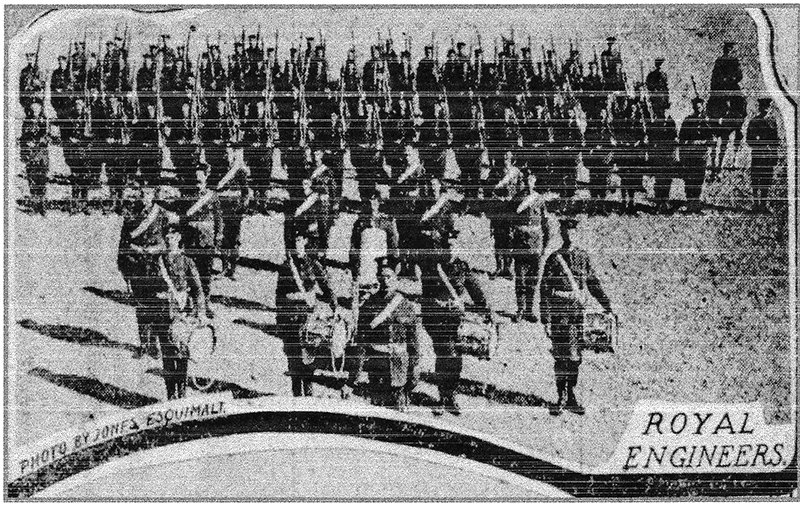 |
| Royal Engineers 1906 |
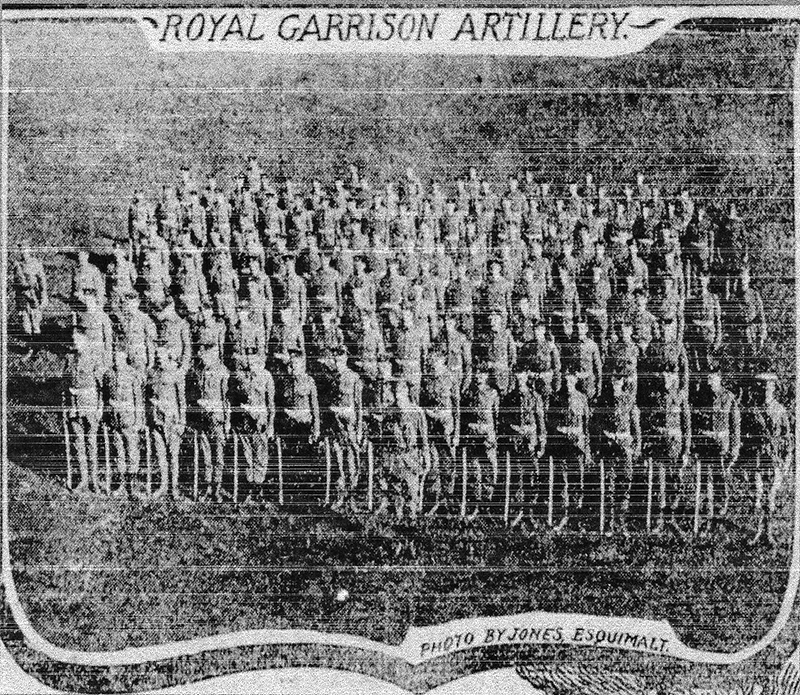 |
| Royal Garrison Artillery |
It numbers in all about 350 officers and men. Of this number all will leave tomorrow with the exception of a half dozen men of the 48th Company R.E., and the officers remaining in Canada. These are: Lt. Col. English, who will spend two years more in the Dominion and Capt. Muspratt-Williams and Lieut. Elliston, who have decided to serve with the Canadian troops in future. Thirty-four men of the artillery and about thirty-one of the engineers also have been mustered into the Dominion service and remain as a nucleus of the new force.
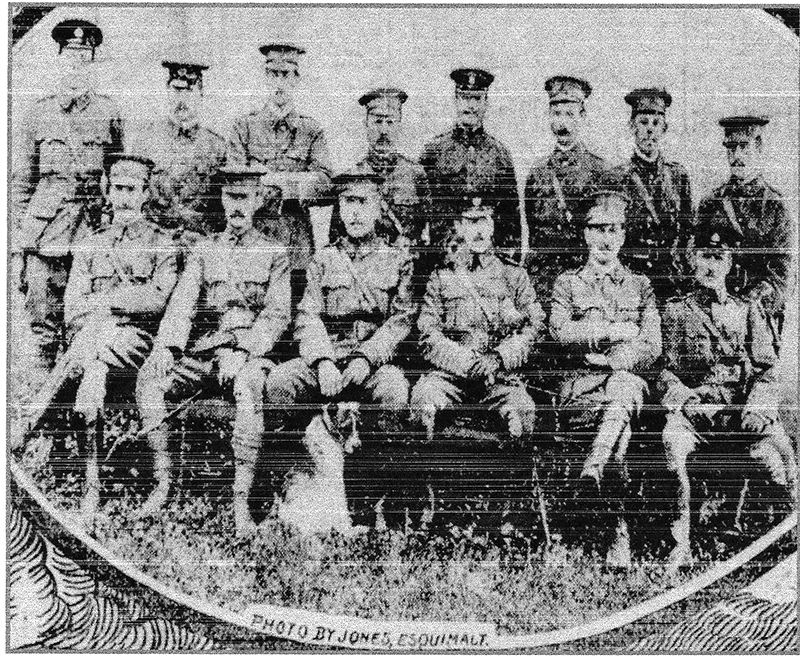 |
| The Last Officers |
- Lieut. Col. Charles Ernest English, Commanding Troops and O.C. R.A.
- Major Edwd. Humphry Bland, O.C. R.E.
- Capt. Reginald L. Muspratt-Williams, R.A.
- Lieut. Haril Henry Foll, R.A.
- Lieut. Peter Elliston, R.A.
- Lieut. Wm. Ralph Thompson, R.A.
- Capt. Daniel Brady, R.E.
- Capt. Chas. Hamilton Verstune-Bunbury, R.E.
- Lieut. The Hon. Francis G. Hood, R.E.
- Lieut. Arthur St. John Yates, R.E.
- Capt. Harry Stevenson Wright, A.S.C.
- Capt. Robert Lionel Popham, R.A.M.C.
- Lieut. Wight, Army Ordnance Dept.
Lt. Col. Charles Ernest English entered the Royal Artillery over a quarter of a century ago, having been gazette lieutenant on 27th July, 1880. He became captain in January, 1899, and on 8th September, 1883, obtained his majority. Upon being appointed to command the troops at Esquimalt he was breveted lieutenant-colonel. He is no stranger to Canada, having spent seven years at the Royal Military College at Kingston. At the request of the Dominion authorities the war office has permitted him to remain two years more in Canada, but at what point is at present undecided.
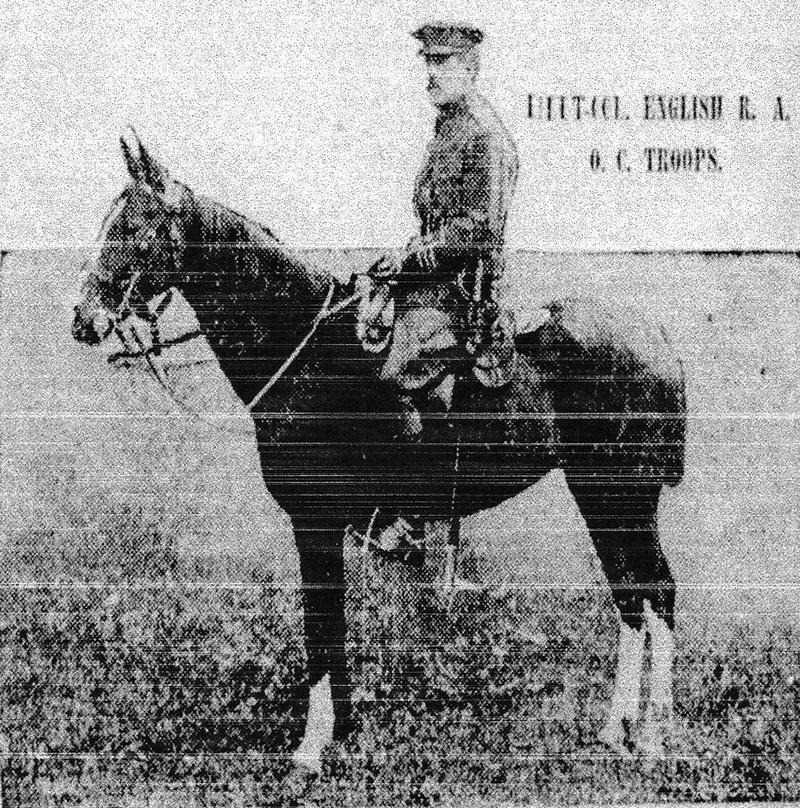 |
| Lieut. Col. English R.A. - O.C. Troops |
Capt. Reginald L. Muspratt-Williams, R.A., was gazette second lieutenant on November 1st, 1890, lieutenant three years afterwards, and captain on October 14th, 1899.
Lieut. Peter Elliston, R.A., who has become a member of the Canadian forces entered the Imperial army on 28th March, 1900, as second lieutenant obtaining his present rank on 3rd, April, 1901. For the present, he will command the Dominion forces at Work Point, and, it is probable, at an early date receive a step in promotion and become captain.
Capt. Daniel Brady, R.E., who remains for the present on command of the 48th Submarine Company, has been eighteen years in the service. He was gazette second lieutenant on February 17th, 1888; lieutenant the same day three years later, and captain after eight years further service, on 17th February, 1899.
The ranking officer to accompany the troops on their voyage to the old country is Major Edward Humphrey Bland, R.E., who has twenty-two years service. Entering the army on 9th December, 1884; as lieutenant, he became captain ten years afterwards, and obtained his majority on New Year’s Eve, 1902. Major Bland served during the Miranzal expedition with the Bengal Sappers and Miners, for which he holds the medal and clasp, and with the Isazal field force in 1902.
The Imperial forces, during the whole time of their residence in Canada, have been a prominent factor, in circles other than their own limited sphere of duty. In addition to the various public works mentioned at the beginning of this article they have proved themselves true brothers in arms to the British Columbia militia and volunteers. O every occasion when evolutions of the combined forces would be of use in training the local companies both officers and men have given willing assistance. This has been done by the officers with the greatest alacrity, while the men under them have not only considered such work well within their line of duty, but each occasion also has been marked by a spirit of fraternity that showed the duty was also a pleasure. Several schools of musketry and gunnery instruction have been of material service in bringing the provincial force up their present standard of efficiency and friendly rivalry of the rifle range has been – it is hoped, of good effect to all concerned.
Of the social activities of those who are about to leave the garrison it is not the province of this article to record, but every function of any importance had an added interest by reason of the presence of the officers, while the men have added to the success of every popular celebration.
The celebration of Victoria Day will for many years not seem the same, while the event may be carried on successfully as heretofore it will lose that Imperial touch which has been one of its chiefest charms.
In the field od athletics the garrison has always occupied an important position, particularly in Association football. The departing garrison takes with it the championship trophy for this sport both of Vancouver Island and British Columbia, and none are more willing to see it repose in the present hands than those who went down to defeat before the boys from Work Point. Victoria had the distinction of lowering the colors of the garrison during last season when the Victoria United team beat them in a well fought game, so it not with thoughts of total inequality they saw the trophy handed over on Wednesday, but rather as a due award to the victors of the spoils of war.
Two officers and about sixty-five men will remain in Canada as part of the Canadian forces. They are worthy successors to those who remained of the old guard in 1863, and it is confidently expected will make a mark of equal prominence and high character in the history of British Columbia that will be written in years to come.
EXPRESSIONS OF REGRET
On Behalf of the Province
British Columbians would be forgetful and ungrateful were they not to feel regret at the departure from this Province of the Imperial troops. As citizens of the Empire, we have all felt proud of the past achievements of the army and navy, and it has been a pleasure to have amongst us representatives of the imperial service. The good conduct of the men and cordial relations that have existed between the troops and the citizens make the parting of old friends. The new conditions, however, do not mean any loosening of the ties between Canada and the Motherland. The garrison that will replace the detachments now about to leave for England will still be soldiers of His Majesty, and if the need should again arise, Canadians and their brothers of the Home Land will still be found shoulder to shoulder, united in defence of the Empire to which we all belong.
RICHARD McBRIDE, Premier
From the Citizens of Victoria
The following resolution was unanimously passed at the last meeting of the city council:
“Whereas the time has arrived, in accordance with the decision of the Imperial authorities, for the withdrawal of the Imperial troops, from their station at Work Point Barracks and their return to England.
There-fore let it be resolved, that this council deem it fitting to express the unfeigned regret which is shared by all classes of the community at their departure, the high estimation in which both officers and men have always been held by the citizens, and the sense of loss felt at the thought that the relations which have existed so long and so happily between them should so soon be severed. The council desires to assure them that they will always have a place in the esteem and regard of the citizens generally, and that in leaving they carry with them the best wishes that can be expressed for their future welfare, happiness and fair renown.”
TIMES
May 12, 1906 (2)
An article titled “in the meantime” on the departure of the Imperial Forces from Esquimalt.
May 17, 1906
GOOD BYE TO THE SOLDIER BOYS
Imperial Troops to Sail Early This Morning En Route to England
This morning at 8 o’clock, the last British Garrison in Canada will embark on board the steamer Charmer at the C/P.R. dock, on Belleville street for Vancouver for transportation east by special train en route to Liverpool where this company will be disbanded. The troops will parade at the barracks at Work Point, where their baggage has been packed up in readiness for the other days arranged for departure, and will march to the corner of Head street and Esquimalt road where special cars will await them and they will be transported to Belleville street where the Fifth Regiment band will await them at 7:30 a.m. to play them to the steamer. The band which has been ordered to parade in uniform without belts will remain on the wharf to discourse music until the Charmer steams away with the homeward bound troops. Premier McBride, Mayor Morley, and Aldermen will be present, and it is expected that a large number of citizens will be on the wharf to bid the troops farewell.
All the works at Esquimalt and work Point have been taken over and the present garrison, to the command of Lieut. Ellison, R.C.G.A., will await until the arrival of other Canadian troops to fill the complements. The present garrison left after the departure of the majority of the troops this morning will be 33 artillerymen and 20 engineers. The engineer complement will only be increased by nine. This branch will have charge of the buildings and repair work, together with the searchlight and their machinery. The artillerymen will take care of the defence works otherwise. In the investigation of the canteen accounts preparatory to departure it has been found there is a surplus of $2,000, and it has not been decided how this will be dealt with. It has been suggested that it be divided amongst the members of the garrison pro rata.
Victoria Times
May 17, 1906
FAREWELL TO THE IMPERIAL TROOPS
Thousands Gather at the C.P.R. Dock and Outer Wharf
To Wish Godspeed to the Departing Garrison
With military precision the Charmer pulled out from the C.P.R. dock at 8 o’clock this morning having on board the departing Imperial troops. The send off given them was worthy of Victoria. Many citizens who usually at that hour are enfolded in the arms of Morpheous were either on hand at the dock or interestedly watching the proceedings from James Bay causeway.
Last night was the occasion of general farewell festivities for officers and men alike. The officers spent the evening bidding good bye to friends and incidentally a number of them were entertained at the Union and Pacific clubs. Most of the non coms and men enjoyed their last evening down town and the usual resorts were enlivened with by songs new and old. A most pleasing feature was the total absence of rowdyism of any kind, for, although several stirrup cups were indulged in by most concerned no intoxication was seen anywhere and neither the garrison nor city police made any arrests.
On an occasion which would have warranted, if any would, the presence of a modicum of convivial disturbance it is extremely gratifying to be able to state that Tommy Atkins showed himself, as usual, a gentleman in khaki.
There was an impromptu concert party arranged among the departing soldiers. A group of about a dozen evidently determined to celebrate their departure like a body of old English waits and went from point to point in the business section singing such old favorites as “Farewell, Farewell, My Only Love.” And that omniscient army ditty, not mentioned in polite society, “My Name is Jack Hall.” Many attended the performance at the Victoria theatre and several others the vaudeville show at the Grand. Wherever they went the boys were received with open hospitality, and on all hands was heard expressions of regret at their impending departure.
All concerned with providing transportation carried out their duties to the letter. At 7:15 the tramway company had five large cars waiting at the top of Head street, and the troops went aboard, under direction of the officers, without disorder. Both the new palace cars recently placed on the Gorge run were requisitioned and the others were of the largest carrying capacity available.
The short ride to Belleville street was enlivened with music and song, the drum and fife band in the front car playing “The Girl I Left Behind Me.” And other favorite airs, while each conveyance had its own special song, prominent among them being “You Can’t Beat Ivanhoe.” At the end of the causeway the Fifth Regiment band was waiting to receive the men about to depart, and preceded them to the dock. On arrival they were stationed at the farther end and played numerous patriotic selections until the vessel had disappeared round Sehl’s Point.
The capacity of the dock was taxed to the utmost by the thousands wishing to see the last of the garrison. Many who could not gain access lined the approach and congregated along Belleville street and the south side of the causeway. All the officers of the Fifth regiment in the city and those remaining at Work Point were there in uniform, and Victoria was officially represented by Mayor Morley and a number of the aldermen. The police arrangements were admirable, a large force of constables under Chief Langley keeping the roadway clear and preventing undue crowding.
And then came the last good bye. As the troops appeared marching down Belleville street the crowd broke into spontaneous cheering, which was taken up by those on the dock and the stalwart column marched down to the boat between two enthusiastic lines of well wishing but regretful citizens.
No halt of any length was made on the wharf. Squad by squad the troops were marched aboard and crowded the rails to shake hands for the last time with their numerous friends. The local band enlivened the last few moments with Canada’s national song, “The Maple Leaf Forever.” And the Imperial anthem “God Save The King.”
There must be some aching feminine hearts in Esquimalt and Victoria today. Bevies of beautiful damsels spent the last few moments bidding farewell to their old time military chums. One young lady even attempted to board the boat, but discipline overcame chivalry and she was compelled to desist. But a stalwart son of Britain leaned over the rail and a blonde moustache resting lovingly on an upturned blushing cheek, betrayed one fond farewell to a fair daughter of Victoria.
When 8 o’clock arrived the ropes were cast off. The band on the boat broke out in the inspiring strains of “Rolling Home to Merry England.” The Fifth Regiment in answer, playing the famous melody of farewell, “Auld Lang Syne.” A last three cheers and a tiger were given for those now entering upon their long journey to the home land, which received a hearty response from the soldiers congregated at the bow of the boat and the Charmer steamed away bearing a more valuable burden than she ever carried before – the last of the Imperial troops stationed in Canada. Though this was the good bye of most residents of the city a large number had gathered at the outer wharf. As the boat passed that point there were still other farewells to be given that took the form rendered sacred by immemorable custom – the British Cheer “Hurrah.”
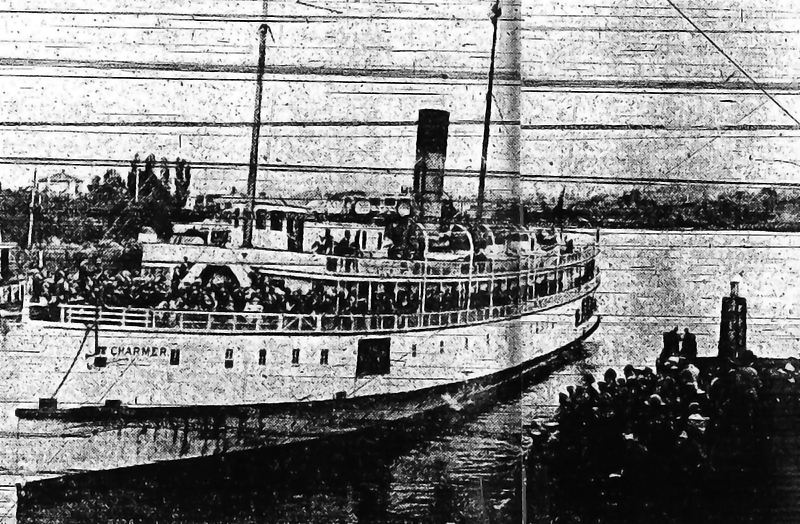 |
| Departure of Troops May 17, 1906 on the Charmer |
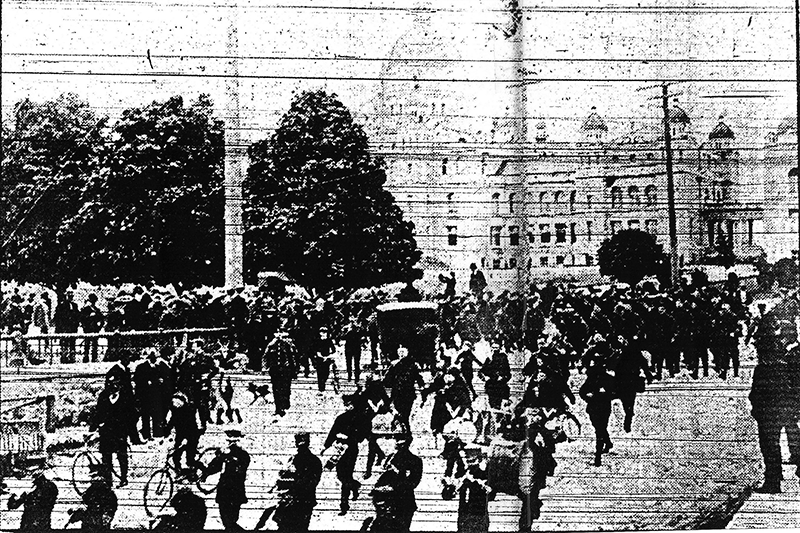 |
| Departure of Troops May 17, 1906 Parade |
Daily Colonist
May 18, 1906
DEPARTURE OF THE IMPERIAL FORCES
Troops at Work Point Barracks Left Yesterday En Route to England
A STIRRING SCENE AT THE WHARF
Patriotic Demonstration on the Part of Officials and the Citizens
We're goin' 'ome, we're goin' 'ome
Our ship is at the shore
An'you must pack your 'aversack
For we won't come back no more.
Barrack Room Ballad |
A bugler stood on the incline at Head street, sounding "The Last Post". Straggling up the road were khaki clad soldiers, with blue blankets swung like bandoliers, nearly all carrying bundles; express wagons loaded with kit boxes and dunnage, and hacks laden with the families of those who came from the married quarters, were hauled slowly up the hill to where the last Imperial garrison in Canada was assembling to ride for the last on the Esquimalt cars - they’ll be calling them trains long before they see the fog of the Mersey. This was soon after 7 a.m. From the crest of the hill they saw the red brick village of barracks, cantonments, stores and other buildings, with the roofs gleaming in the morning sun, and heard the last flares of the bugler who stood on the hill crest sounding “The Last Post”. The garrison was bidding farewell to the most western outpost of the Empire and to three score comrades who remained to take service with Canada.
The drum and fife band of the garrison occupied seats in the leading car, and citizens who were abroad heard the strains of “The Girl I Left Behind Me”, and several popular and lively ditties, which enlivened the journey to the James Bay causeway, where the Fifth Regiment band was waiting to play the soldiers to the dock, where the steamer Charmer, impressed as a troopship, was waiting. Citizens broke into a hearty cheer as the troops formed behind the militia band, and it was between an avenue of cheering people that the garrison marched to the dock to embark. The dock was crowded. Mayor Morely was there to represent the city, and the officers of the Fifth Regiment were present in uniform. Chief Langley and a squad of constables lined a way for the soldiers, who embarked at once ‘midst loud cheering and martial music.
The Charmer's rail was soon crowded with soldiers in marching order, and their women and children, still holding their bundles, crowded in amongst those who packed the forward passenger deck and lined the rail from the stem to the after house, and they were jolly withal, waving handkerchiefs, shouting farewell messages of all sorts, and singing. A squad began the Canadian anthem, “The Maple Leaf Forever”. Those ashore, took up the strain, and the band was soon playing the accompaniment. Soldiers leaned over the rail to have a final handshake with civilian friends, ladies waved farewells with their handkerchiefs – one stood tiptoe on the guardrail while a fair moustache rested for a brief moment on the reddening cheek- and in the crowd on the wharf there was a tumult of cheering,, the martial airs of the band partially drowned.
The whistle tooted at 8 a.m. The band was playing "Rolling Home to Merry England" and the soldiers took up the song. Already they had begun to roll home to merry England, 7000 miles away. “Home, Home Sweet Home” played the band, and with a heartiness that made it full throated, the throng broke out with three hearty British cheers, which were answered with lusty roar from the steamer’s deck as the distance between wharf and steamer became wider. The vessel swung, and as she turned her bow outward the band played “Auld Lang Syne” and the departing troops were carried out of earshot, "God Save The King".
Thus the Imperial garrison — 48 years after the landing of the first Imperial garrison, left for home. Standing on the wharf stood Col. English and Col. Wolfenden, watching the departing steamer round Sehl’s Point and disappear en route to Vancouver, where the special troop train was waiting to carry the force to Quebec for embarkation on the Allen liner Virginian. One of the two officers was the commanding officer of the last garrison, the other was the first, and is now the oldest of the soldiers in British Columbia, if not in Canada. Perhaps they were sorry to see the force depart. One who stood nearby was. He said: "Someone should take a photograph of this scene; Sir Wilfred Laurier would be glad to have it".
One officer yesterday who had expected to journey homeward with his comrades was left behind; Capt. Muspratt - Williams had his belongings packed and was ready to start. Three weeks ago he had made application to Ottawa to be retained in Canada, but not until he was on the point of departure did word come. Then came his appointment as Captain in command of the Canadian garrison, at Work Point, his commission dating from Wednesday. Capt. Muspratt – Williams, who is well known here, was gazetted second Lieutenant on November 1, 1890, as Lieutenant three years later, and on October 4, 1899, was gazetted as Captain. Over a year ago he married Miss Drake, a niece of Mr. Justice Drake. Lieut. Elliston, the other Imperial officer who remained, is also married to a Canadian lady. Lieut. Fall, also remained behind; he has been ordered to Singapore, and will leave by the Empress of China.
Photographs of departure of troops; also postcards of same on sale. Victoria Book and Stationery Co., Ltd.
May 19, 1906
THE CANADIAN SERVICE
Sir: Allow me to say in a few words as regards the write up in the Times last evening about the departure of troops from the barracks. I do not know where the reporter received his information, but it would be well to always get the truth as far as possible. The Times says that it is understood that more would have liked to enter the Canadian service, but were barred because of the defaulter sheets. Now I know on excellent authority that this is not the case, and that the Canadians did not get all the excellent characters belonging to the garrison, in fact, there was an artilleryman, who shall be nameless in the guardroom at the time of his exchange from the Imperials to the Canadians, and his previous character was none of the best.
As the boys are not here to answer for themselves, I will take the trouble to tell you that most of the troops gone home bore excellent characters, and the reason they did not join the Canadians was that they did not wish to sever from the certainty of Imperial service for the uncertainty of the Canadian service. Most of them saw what hash had been made during the last twelve months of the exchange of garrisons, and acted accordingly.
In conclusion, I may say that not one of the men gone home would have taken on with the Canadians at the same rank; if so, the Canadians authorities would have been glad to get them.
Hoping the Times reporter will keep his ears open next time.
IMPERIAL
Thus the Imperial troops left Work Point barracks to return to England and the unit to be disbanded. The Royal Engineers presented a cup to the 2 – 44th Company R.E. on the departure of the British Garrison. It is a small trophy, engraved on one side:
ROYAL ENGINEERS
FOOTBALL LEAGUE
CHALLENGE CUP
VICTORIA, B.C.
(Instituted)
1904
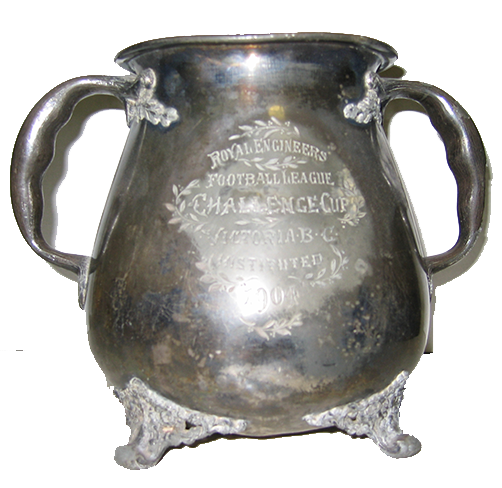 |
Royal Engineers Football League Challenge Cup |
And on the other side:
REGIMENTAL FOOTBALL
CUP
PRESENTED TO
THE 2 - 44th COMPANY R.E.
ON THE REMOVAL OF
THE BRITISH GARRISON FROM
ESQUIMALT, B.C.
IN MAY 1906
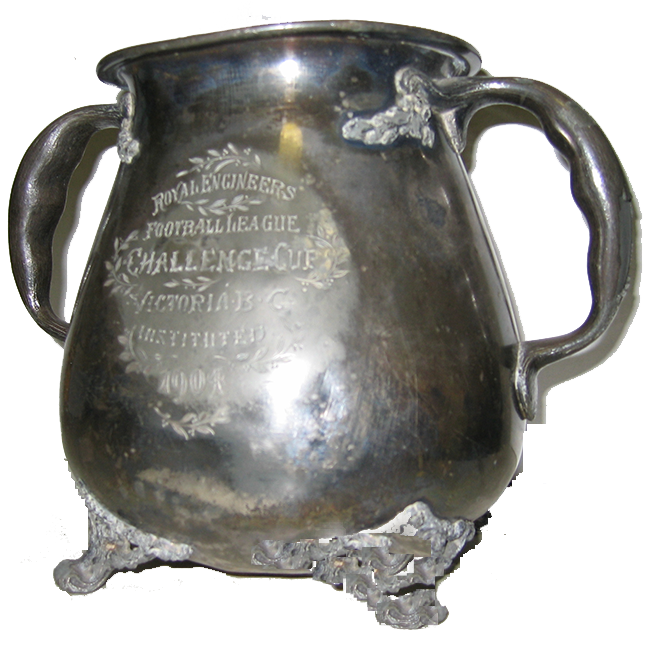 |
Royal Engineers Football League Challenge Cup |
I purchased the cup in December 2000.
Daily Colonist
October 31, 1906
OFFERS TO GIVE CITY TONS OF GUN COTTON
Lieut. Hughes R. E. Waits on Mayor Morley With Generous Proposition
Mayor Morley was waited on yesterday morning by Lieut. Hughes, R.E. who informed him that orders had been received at Work Point to destroy all gun cotton now on hand. Roughly estimated, there is about forty tons of this highly explosive material stored at the barracks and before consigning it to the sea the federal authorities thought it well to offer it to the city.
His Worship was for a time unable to say what could be done with the material, but after considering the matter he arrived at the conclusion that it would be a good scheme to utilize it for blasting the rocks in the harbor. He referred the matter to Capt. Troup, as chairman of the harbor committee of the board of trade, who was of the opinion that it could be used to good advantage. Permission, however, must first be obtained from the authorities at Ottawa.
Last evening Mayor Morley said that if the city decided to accept the gift, the engineers at Work Point will have charge of the work of removing the rocks, and being experts in this line, they would likely be able to avoid damage to the property in the vicinity. The rocks it is proposed to operate on have always been a source of annoyance to navigators, and on occasions some of the local coasting vessels have been hung up on the obstructions.
... continued in 1907 ...
|

